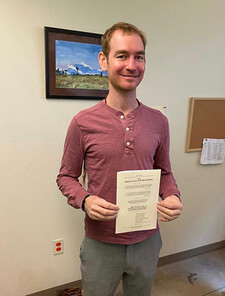Fellow Spotlight: Bernstein Postgraduate Fellow Andrew Udelsman ’17
Current Robert L. Bernstein Fellow Andrew Udelsman ’17 is spending his fellowship year at the Texas Civil Rights Project as a Legal Fellow. Based in Alamo, Texas, Udelsman is working to protect the right to seek asylum at the U.S.-Mexico border by providing legal assistance to asylum seekers lacking an attorney and helping overturn policies that jeopardize immigrant communities’ and asylum seekers’ livelihood and liberties. He was drawn to the work, he said, by the urgent need for representation among asylum seekers he saw all over the news — and, he added, “it sounded fascinating to be here at the border.”

Udelsman with the amicus brief he submitted to the U.S. Supreme Court.
At the Law School, Andrew was a member of the Allard K. Lowenstein International Human Rights Clinic and a student director of the Media Freedom and Information Access (MFIA) Clinic where he was able to take a closer look at human rights violations committed by the United States government. During his participation, he litigated to release information regarding the CIA’s post-9/11 torture program.
In the Lowenstein Clinic, Udelsman worked to combat the use of solitary confinement in federal prisons. Seeing the extent of the human rights violations occurring in the U.S. prison system, he said, strengthened his commitment to pursuing human rights work domestically. “There is so much work to be done in this country,” Udelsman says. “[The Lowenstein Clinic] showed me that federal litigation can be an effective tool to halt [human rights violations] and to effect change.”
Udelsman is particularly concerned about the Migrant Protection Protocols (MPP), also known as “Remain in Mexico,” a Trump administration program that forces asylum seekers to wait for their immigration court hearings in Mexican border towns. While these towns are considered too dangerous for American residents to visit by the U.S. State Department, asylum seekers are compelled to remain there, homeless, he said, where they are vulnerable to crime. “Mexican cartels are targeting asylum seekers because they know they’re vulnerable and might have money so they kidnap them,” Udelsman explained. “In Nuevo Laredo, Mexico” — one of these border cities — “up to 80 percent of asylum-seekers have been kidnapped.”
As a Legal Fellow, Udelsman has helped Central-American asylum seekers who have been subjected to the Trump Administration’s “Remain in Mexico” program. Through his work, he has seen the tent cities where asylum seekers reside south of the U.S. border after filing their initial asylum claim. “The living conditions are abysmal,” Udelsman says. “Matamoros is one of the safer places...it’s a 2,000-person tent city with minimal infrastructure. The Mexican government has provided little assistance beyond port-a-potties, and the U.S. government has provided nothing at all.”
In addition to the appalling living conditions suffered by asylum seekers, Udelsman has witnessed clients face their asylum trials in tent courts. In inflatable, loud, and over-patrolled makeshift courtrooms, Udelsman said, asylum seekers often have to arrive at 4:30 a.m. for multiple hearings, only to see their judge through a video screen and endure the process without an attorney. With a success rate below one percent, far lower than asylum proceedings in other parts of the U.S., Udelsman said “it does not feel like justice.” Rather than affording asylum seekers fair hearings, he explained, the government “is treating them like they are too dangerous to even sit in the same room as a judge.” Once a seeker is denied asylum, they are deported back to their country of origin, where many face persecution due to their race, political views, or gender.
While the Trump administration justifies the “Remain in Mexico” program as an incentive for asylum seekers to attend their court dates, Udelsman said that the “facts do not support that view.” Instead, he said, he has witnessed how this program is negatively affecting tens of thousands of people. Though he has been able to support various individuals facing the system, ultimately Udelsman aspires to systemic change, which is being pursued in courts around the U.S. In February, the Ninth Circuit Court of Appeals in California briefly blocked MPP in California and Arizona, finding that it violated federal and international law. However, on March 11, 2020 the Supreme Court stayed the appeals court’s ruling and revived the program. Meanwhile, Udelsman is working to help the most vulnerable people circumvent the program, such as LGBT and disabled people.
Udelsman has also submitted an amicus brief to the Supreme Court in which he argues that the methods used by the Department of Homeland Security to build the border wall are illegal. He specifically criticizes the 2005 Real ID Act, which the Secretary of Homeland Security used to waive contracting laws.
Under the Real ID Act, the Secretary of Homeland Security, Chad Wolf, has claimed authority to waive laws for building the wall. In the Valley, according to Udelsman, the Secretary has waived 28 laws that would otherwise require construction to occur in a socially and environmentally responsible manner. Udelsman argues that it is unconstitutional to delegate such sweeping lawmaking power to an unelected official.
At the frontlines of immigration law, Udelsman is spending his Bernstein Fellowship year in a unique position to litigate strategically against the Trump Administration’s “policies of exclusion” and in favor of people’s international right to seek asylum.


